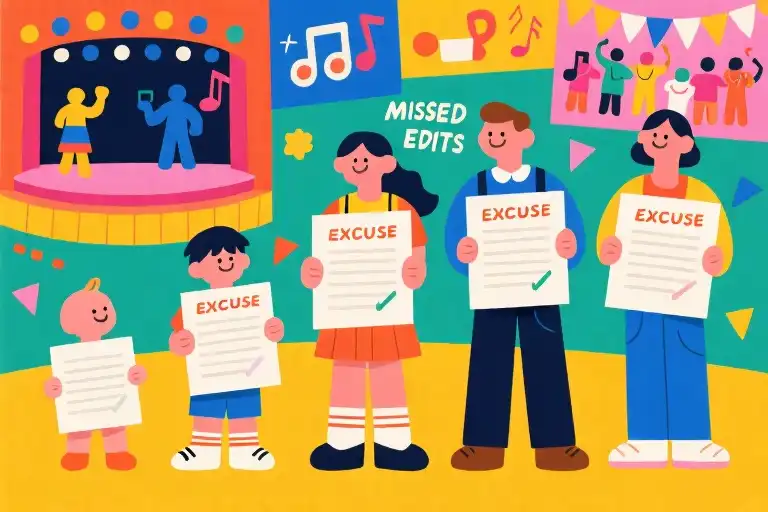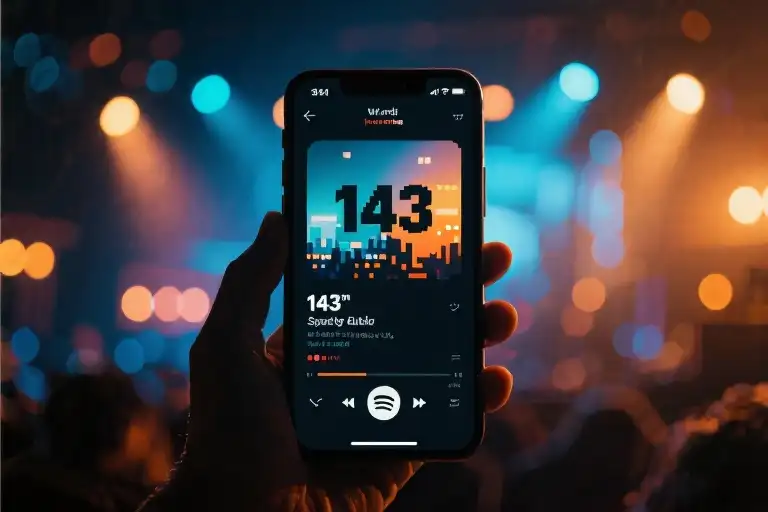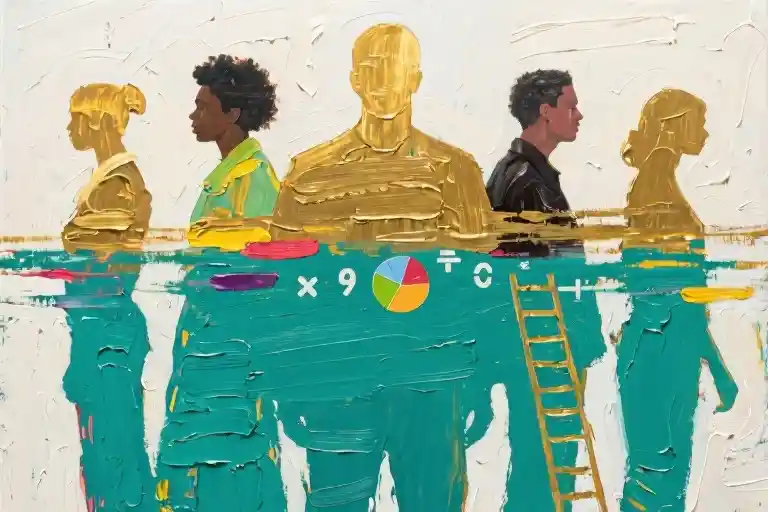The last time you bailed on plans with a perfectly valid excuse—was it yesterday? Last week? Or are you currently typing out an apologetic text with one hand while clutching your third coffee of the morning with the other? From the crib to the cubicle, humanity’s repertoire of “legitimate reasons to miss important things” has evolved right alongside our ability to feel guilty about them.
Consider this your official permission slip to laugh at the universal experience of well-intentioned flakiness. Whether it’s infant object permanence issues or adult-onset FOMO fatigue, every life stage delivers its own signature flavor of social near-misses. That childhood best friend’s theatrical debut you missed because your mom’s phone number might as well have been nuclear codes? The underground concert that got sacrificed to the sleep gods? The poetry reading lost to an accidental hibernation? Welcome to the unofficial archive of almost-attendances.
What makes these moments so deliciously relatable isn’t just the failures themselves—it’s the creative gymnastics our brains perform to justify them. At zero, we blame Piaget’s developmental milestones. By twenty-four, we’ve upgraded to blaming artisanal mezcal. The excuses mature, but the underlying truth remains: growing up means collecting an impressive portfolio of “I swear I meant to” stories that sound increasingly ridiculous in hindsight.
This isn’t another lecture about commitment or time management. Consider it more of a mirror held up to all those times life happened while you were busy making other plans—complete with scientific explanations (baby brains!), cultural commentary (why do hockey practices always win?), and enough self-deprecating humor to make that lingering social guilt finally pack its bags. Because if we can’t laugh at the absurdity of human connection in the modern age, we’d all be stuck crying into our overpriced avocado toast.
So before you judge that friend who ghosted your last gathering, take a nostalgic trip through the greatest hits of plausible deniability. You might just discover your own life story hiding between these missed connections—and finally give yourself permission to stop treating RSVPs like binding legal contracts.
Age 0: The Existential Crisis Baby
“I would love to come over after daycare and gum some of your soft plastic toys,” says every baby ever, “but I’m still conducting field research on object permanence.” Welcome to humanity’s first social dilemma – when your friend leaves the room, do they cease to exist like that missing sock from last laundry day?
This is where our lifelong journey of missed connections begins. At age zero, we’re all tiny philosophers wrestling with existential questions between nap times. That drool-covered rattle isn’t just a toy – it’s Schrödinger’s plaything, simultaneously existing and not existing depending on whether it’s within our limited field of vision.
Modern psychology calls this “object permanence development.” Babies call it “why does mommy disappear when she goes to get my organic pureed carrots?” The struggle is real. My separation anxiety could give a golden retriever puppy a run for its money. We haven’t yet mastered object permanence, but we’ve already perfected FOMO (Fear of Missing Out, or in baby terms, Fear of Mommy Out).
Here’s the tragicomedy of infant social life:
- Your tiny hands desperately reach for a playmate
- They step out to grab a diaper
- Your developing brain whispers: “They’re gone forever”
- Cue the waterworks
It’s not that we don’t want to socialize. We’re simply victims of our own cognitive development. That colorful playmat might as well be the stage for a Greek tragedy – “Oedipus Rex, but with more drool and fewer eye-gougings.”
Looking back, perhaps those early missed playdates were preparing us for adulthood. The excuses get more sophisticated (“Sorry, big work deadline” replaces “Sorry, still figuring out object permanence”), but the emotional whiplash remains similar. The main difference? Now we have object permanence… but somehow still lose our phones in plain sight.
So here’s to the original social butterflies – the babies who wanted to gum your toys but got distracted by the crushing weight of existential uncertainty. Little did we know, this was just level one in the video game of human connection.
Age 9: The Mom’s Phone Number Blackhole
“I’d kill to see you play Sour Kangaroo in Seussical,” you whispered during math class, pencil eraser tapping against your homemade audition sheet. “But unless your mom calls mine by tomorrow afternoon…”
The great tragedy of third-grade social planning wasn’t about clashing schedules or forgotten permission slips – it was the terrifying realization that our mothers’ phone numbers might as well have been nuclear launch codes. We’d recite them daily like multiplication tables (“555-0182… no wait, was that 0812?”), only to blank out when the classroom phone actually rang.
The Paper Trail of Failed Plans
Pre-smartphone childhood operated on a fragile ecosystem:
- The Sacred Homework Folder: Where phone numbers went to die beneath spilled applesauce
- The Classroom Landline: Weaponized by teachers (“Call your mother RIGHT NOW”)
- The 50% Rule: Half-remembered digits guaranteed to connect you to a confused dry cleaner
We’d watch enviously as the “cool kids” with organized moms coordinated playdates through neatly typed contact sheets. Meanwhile, our survival depended on:
- Hoping our parents would magically bump into each other at pickup
- Secretly feeding the class hamster extra pellets for good luck
- Resorting to interpretive dance during recess to communicate plans
The Show Must Go On (Without Us)
School plays became the ultimate test of childhood social engineering. You’d spend weeks:
- Practicing jazz hands in bathroom mirrors
- Trading pudding cups for better roles
- Convincing yourself the raccoon costume was “artistic”
Only to miss your best friend’s big moment because:
- Your mom wrote the date on a napkin that got used for a juice spill
- The family calendar still showed February in April
- Someone’s little brother ate the reminder note (literally)
“At least we’re missing it together,” we’d console each other while chewing stolen cafeteria cookies. The unspoken truth? We were all just one forgotten phone digit away from social oblivion.
Modern Throwback Moment
Today’s kids will never know the adrenaline rush of:
- Dialing random numbers hoping to hit a classmate’s house
- The specific panic when the office lady says “I’m calling your mother”
- That one kid who somehow memorized EVERYONE’S contacts (probably running a Fortune 500 now)
So here’s to the lost art of forgotten phone numbers – the original social media ghosting. And to all the Sour Kangaroos we never saw: your jazz hands live on in our childhood regrets.
Age 16: When Family Is the Ultimate Villain
“I know Liesl is the featured supporting role! But my mom thinks my brother’s hockey stick is more important than your Broadway dreams.”
This was the year we discovered parents could weaponize Google Calendar. While you were belting Sixteen Going on Seventeen in satin dirndls, I was trapped in a minivan listening to my brother’s hockey gear rattle like a sarcastic applause track. The smell of stale athletic tape and adolescent resentment still lingers.
The Sound of Muffled Rebellion
High school theater kids understand the hierarchy of suffering. Missing opening night for family obligations wasn’t just inconvenient – it violated our unspoken Les Mis-level code of solidarity. My mom’s insistence that “family comes first” suddenly felt less heartwarming and more like a hostage situation when applied to fetching sweaty shin guards from some suburban ice rink.
We perfected the art of passive-aggressive car ride commentary:
- “Funny how you never forget HIS practice schedule.”
- “The von Trapp children at least got to sing before being abandoned.”
- “Do you think Coach would notice if I ‘accidentally’ left his stick on the bus?”
The Hockey Stick vs. The Spotlight
What they don’t tell you about teenage social guilt is how physical it feels. That lump in your throat when seeing cast party Snapchats? The phantom vibration of your silenced phone during curtain call? The way your stomach drops when your friend casually mentions “we saved you a program”? It’s like emotional heartburn with no antacid.
Yet somewhere between dress rehearsals and penalty boxes, we learned our first adult lesson about priorities. Not the Hallmark-card version, but the messy reality where:
- Sibling obligations don’t care about your social currency
- Resentment makes terrible fuel (but great journal entries)
- Some friendships survive missed performances, others fade like stage makeup
Encore: The Unexpected Plot Twist
Years later at a holiday party, my brother drunkenly confessed: “I hated hockey. Just wanted you to notice me.” Turns out we’d both been starring in different coming-of-age stories all along – his about insecure little brothers, mine about learning to see beyond the spotlight.
Maybe that’s why The Sound of Music reruns still sting. Not because I missed Liesl’s solo, but because I finally understand why Maria kept singing about “favorite things” – sometimes you need clichés to survive the moments when life feels less like a musical and more like a never-ending carpool.
Age 20: The Nap That Ate the World
College was supposed to be the time when we finally gained control over our lives. No more parental curfews, no more mandatory attendance – just pure, unadulterated freedom. And yet, here we were, victims of our own poorly developed time management skills and an uncanny ability to sleep through anything.
The Afternoon Power Nap That Wasn’t
“I totally meant to come to the alternate poetry reading you set up,” we’d say with genuine remorse, “but my afternoon power nap somehow extended past 11pm. Again.” This wasn’t just any nap – this was the kind of deep, coma-like sleep that made us question whether we’d temporarily died and been resurrected by the smell of instant ramen from down the hall.
The college nap was a phenomenon that defied all laws of nature. What began as a “quick 20-minute recharge” between classes could easily morph into a full-blown hibernation cycle. We’d wake up disoriented, our faces imprinted with textbook patterns, only to realize we’d missed:
- That poetry reading featuring “too awkward” pieces
- The group project meeting
- Dinner at the dining hall
- Possibly an entire season change
The Science Behind Collegiate Sleep Sabotage (Probably)
While actual scientists might point to sleep deprivation and poor time management, we preferred our own pseudoscientific explanations:
- The Dorm Room Black Hole Effect: The unique gravitational pull created by twin XL beds that warps time and space
- Lecture-Induced Narcolepsy: A Pavlovian response developed after one too many 8am classes
- The Syllabus Paradox: The illusion that we had “all semester” to do things, making immediate naps seem harmless
The Social Fallout
Missing events in college carried a special kind of guilt. These weren’t family obligations or work commitments – these were things we actually wanted to do, chosen by our newly independent selves. The poetry reading wasn’t just any event; it was where our friend was finally going to perform that piece about “the existential crisis of laundry day.”
We’d try to make it up to them, of course:
“Next time for sure!” we’d promise, already knowing our circadian rhythm had other plans.
“I’ll watch the recording,” we’d offer, though we all knew there wouldn’t be one.
“Let me buy you coffee,” we’d bargain, then promptly sleep through that too.
The Silver Lining
In retrospect, these missed connections taught us valuable lessons about adulthood:
- The importance of multiple alarms (set to the most obnoxious tone possible)
- That “I’ll just rest my eyes” is the biggest lie we tell ourselves
- That true friends will forgive our sleep-induced absences, mostly because they’ve done the same
Perhaps these college naps weren’t just failures of scheduling, but necessary respites in our first taste of real independence. Or maybe we were just really, really tired. Either way, they became part of our shared experience – the foundation of countless “Remember that time you slept through…” stories we’d laugh about later.
Because in the grand tradition of growing up, sometimes the most relatable moments aren’t the ones we showed up for, but the ones we spectacularly missed – preferably while drooling on a dorm room pillow.
Age 24: The Hangover Domino Effect
That crumpled sticky note on your fridge still says “TONIGHT – Max’s EP release @ The Rusty Needle 9PM” in smudged Sharpie. You even set three phone reminders. But right now, the only thing your body remembers is last night’s $3 PBR specials at The Broken Amp, where your other friend’s synth-pop project opened for a noise band that sounded like “if a fax machine had existential dread.”
Your alarm goes off at 7PM – the “get your shit together” warning you wisely scheduled. The ceiling spins slightly as you reach for water, realizing:
- Your “quick drink” turned into debating music theory until 3AM
- The basement venue has no cell service (“part of its charm”)
- Your “going out pants” still reek of stale beer and poor decisions
You text Max the classic trilogy:
✔️ “SO SORRY”
✔️ “FEELING AWFUL”
✔️ “NEXT TIME FOR SURE”
As you press send, the irony hits – this is the third “next time” this month. Welcome to your mid-twenties, where:
- Every friend suddenly has a “passion project”
- Weeknights blur into weekends
- Your liver keeps score like a disapproving accountant
The real adulting horror? Knowing you’ll repeat this exact cycle when Max texts about his next show… probably from another basement that smells like “regret and broken dreams with a top note of mildew.”
The Art of Missing Out: A Grown-Up’s Survival Guide
We’ve all been there—that moment when you stare at your phone, drafting yet another “I would love to, but…” text. From diaper days to adulting nightmares, our excuses for missing life’s moments evolve alongside our age, yet somehow remain equally ridiculous. Here’s to the universal language of flaking, perfected through decades of practice.
Age 0: The Existential Crisis Baby
“I would love to come over after daycare and gum some of your soft plastic toys,” thinks every infant philosopher, “but I’m still a little unclear on whether you continue to exist once I can no longer see you.”
Our earliest social regrets stem from pure scientific confusion. Object permanence isn’t just a developmental milestone—it’s the original FOMO (Fear of Missing Out). That rattling toy disappearing behind mom’s back might as well have vanished from the universe. Modern parents track baby’s first steps; they should also document baby’s first existential crisis when realizing friendships require object permanence too.
Age 9: The Mom’s Phone Number Blackhole
Fast forward to elementary school, where friendship coordination depends on two unreliable systems: children’s memories and landline telephones. “I wish I could see you play Sour Kangaroo,” we lament, “but neither of us can remember our moms’ phone numbers to arrange pickup.”
This era birthed our first sophisticated excuses—not quite lies, but creative interpretations of reality. The class play program becomes a tragic document of could-have-been friendships, its crumpled pages stained with juice box residue and unrealized social potential.
Age 16: When Family Becomes the Ultimate Villain
Teenage years introduce a formidable excuse-generating machine: family obligations. “I know Liesl is a featured role!” we fume, “but my mom insists I retrieve my brother from hockey practice.” (Cue dramatic hair flip.) Parental interference reaches Shakespearean levels—every social refusal feels like a modern-day Romeo and Juliet scenario, minus the romance and plus more eye-rolling.
High school planners don’t show the real scheduling conflict: your social life versus your mother’s Google Calendar. Spoiler: Google Calendar always wins.
Age 20: The Nap That Ate the World
College “power naps” demonstrate time’s fluid nature—what begins as a 20-minute recharge somehow spans entire epochs. “I totally meant to attend your poetry reading,” we text at midnight, “but my eyelids staged a mutiny.”
This marks our transition to self-sabotaging excuses. No longer can we blame parents or undeveloped brains. That 3pm “quick rest” that somehow lasted through dinner? That’s all you, baby. Welcome to adulthood, where your greatest enemy is your own circadian rhythm.
Age 24: The Hangover Domino Effect
Post-college life turns social calendars into Jenga towers—remove one event and everything collapses. “I was coming to your basement show,” we groan into our pillows, “but last night’s dive bar beer is currently reconstructing my digestive system.”
Adult friendships now require advanced logistics usually reserved for military operations. The chain reaction begins with one ill-advised “one last drink” and ends with you texting apologies while hugging a toilet. Congratulations—you’ve mastered the art of grown-up ghosting.
Your Turn: The Missing Out Hall of Fame
What’s your most creative “I would love to but…” moment? Was it:
- The time your dog “ate” your party outfit (conveniently, just as you lost motivation to go)?
- When “traffic” magically only appears when you’re running late to events you dread?
- That classic “I think I’m coming down with something” that strikes precisely at 6pm on Friday?
Share your best missed-connection story below—we’re all collecting these little social souvenirs, one flimsy excuse at a time. After all, adulthood isn’t about showing up; it’s about crafting increasingly elaborate explanations for why you didn’t.





